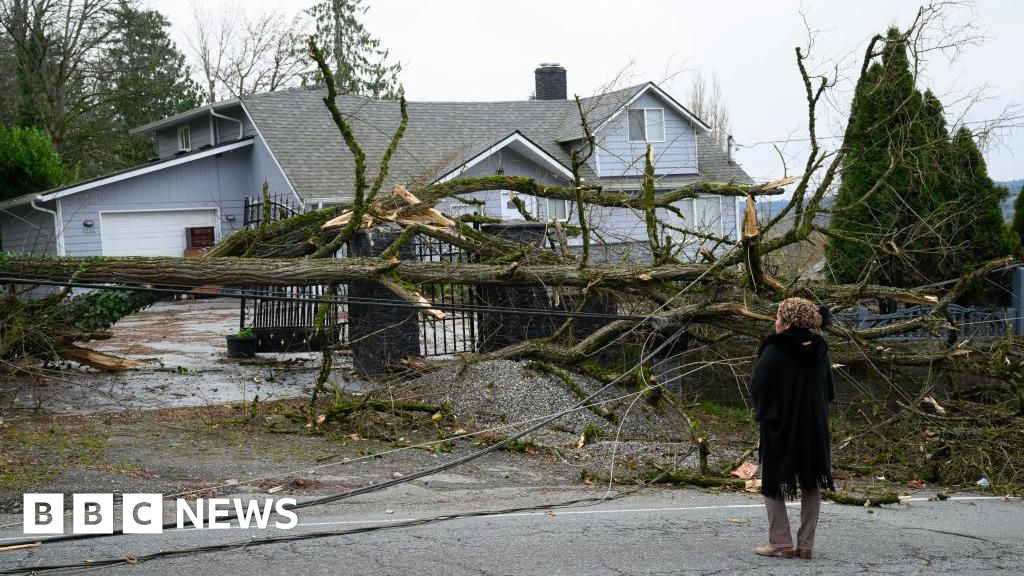
Atmospheric river and bomb cyclone to drench US west coast
Posted on 11/21/2024

A bomb cyclone that hit the US Pacific north-west and killed multiple people is expected to combine with an atmospheric river, bringing life-threatening rainfall and flooding to the western region.
The winter storm has already brought damaging winds and dangerous levels of rain and snow to the US west coast.
But forecasters say the atmospheric river is expected to peak on Thursday and continue for the rest of the week as officials work to restore power for thousands of people who have been without it.
The atmospheric river - which occurs when water evaporates into the air and is carried along by the wind - was moving slowly over northern California on Thursday morning and will slowly head toward the east, BBC Weather said.
The state of California is under an excessive rainfall advisory, with forecasters warning of life-threatening flooding, rockslides and debris flow.
Areas in northern California and south-west Oregon could see as much as 12 to 16 inches (30 to 40 centimeters) of rain on Friday, while northern California could see heavy snowfall, according to BBC weather.
California residents living close to the ocean began filling sandbags on Wednesday to prepare for the powerful rains.
“Remember to slow down and drive cautiously in these hazardous conditions,” California Department of Forestry and Fire Protection said on social media.
As of Thursday morning, 330,000 people were without power in Oregon and 14,000 in California, according to poweroutage.us.
The storm also stretched into Canada, hitting Vancouver Island and knocking power to over 100,000 people on Wednesday night.
At least two women have already been killed this week by falling trees from the storm in the suburbs of Seattle, while two others have been injured.
The "bomb cyclone" - as forecasters call it - was caused by air pressure quickly dropping off the coast, which has rapidly intensified the weather system.
The winter storm has already brought damaging winds and dangerous levels of rain and snow to the US west coast.
But forecasters say the atmospheric river is expected to peak on Thursday and continue for the rest of the week as officials work to restore power for thousands of people who have been without it.
The atmospheric river - which occurs when water evaporates into the air and is carried along by the wind - was moving slowly over northern California on Thursday morning and will slowly head toward the east, BBC Weather said.
The state of California is under an excessive rainfall advisory, with forecasters warning of life-threatening flooding, rockslides and debris flow.
Areas in northern California and south-west Oregon could see as much as 12 to 16 inches (30 to 40 centimeters) of rain on Friday, while northern California could see heavy snowfall, according to BBC weather.
California residents living close to the ocean began filling sandbags on Wednesday to prepare for the powerful rains.
“Remember to slow down and drive cautiously in these hazardous conditions,” California Department of Forestry and Fire Protection said on social media.
As of Thursday morning, 330,000 people were without power in Oregon and 14,000 in California, according to poweroutage.us.
The storm also stretched into Canada, hitting Vancouver Island and knocking power to over 100,000 people on Wednesday night.
At least two women have already been killed this week by falling trees from the storm in the suburbs of Seattle, while two others have been injured.
The "bomb cyclone" - as forecasters call it - was caused by air pressure quickly dropping off the coast, which has rapidly intensified the weather system.
Comments( 0 )
0 0 1
0 0 1
0 0 4












:focal(0x0:8192x4532)/static.texastribune.org/media/files/5278df99870cefcb47bfc12be014f31e/Brooke%20Rollins%20America%20First%20REUTERS.JPG)








:max_bytes(150000):strip_icc():focal(717x430:719x432)/Won-Jang-112324-2cc60236a75c4f009d7136ad03e8c0ef.jpg)

